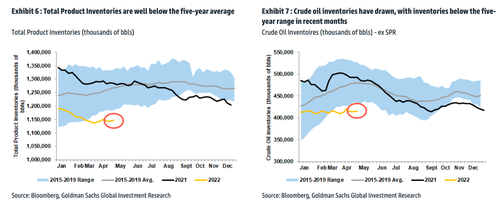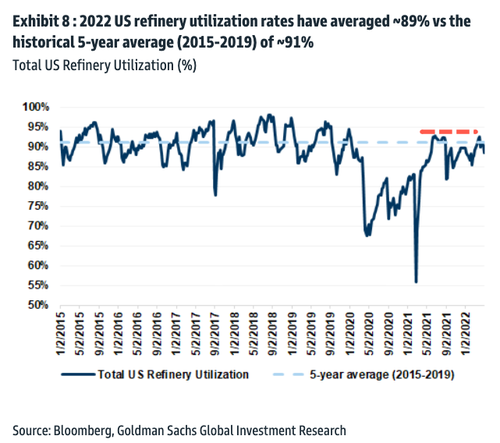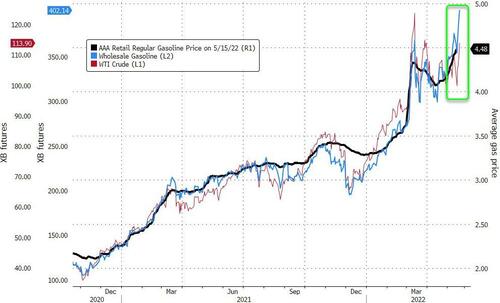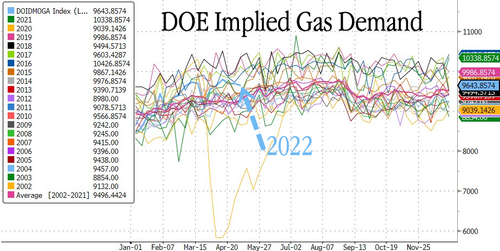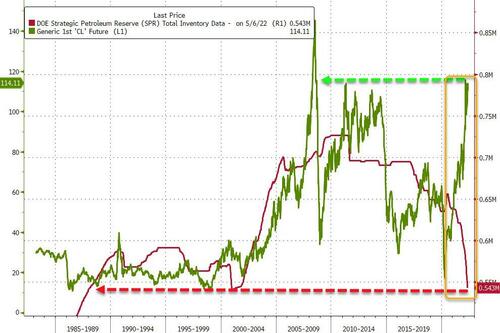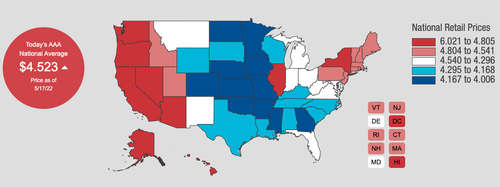
Gas prices at the pump hit $4 a gallon in every state for the first time Monday, according to the American Automobile Association (AAA). This is mainly due to languishing refinery capacity across the US, dwindling fuel stockpiles, and robust demand for gas ahead of the summer driving season.
Kansas, Oklahoma, and Georgia -- the last three holdouts -- saw prices for regular gas surpass the $4 a gallon mark last night. The national average for a gallon of gasoline is $4.523, another record high. The increase comes as the cost of crude oil now tops $114 a barrel.
In a note to clients on Monday, Goldman Sachs' commodity analyst Neil Mehta outlined that rising fuel prices were due to a rash of refinery retirements, reduced Russian energy exports, recovering jet fuel demand, and tight global inventories for products, particularly diesel, have supported higher prices at the pump.
Mehta indicated that US fuel product inventories are 10% below a five-year average and refining utilization rates are below normal.
US refining utilization struggles to increase as the driving season nears.
This means tight supplies and rising demand will only push pump prices higher. Wholesale gasoline prices signal that $5 a gallon on a national level is imminent.
Despite record-high gasoline prices, GasBuddy's head of petroleum analysis, Patrick De Haan, said weekly gasoline demand increased by 3% in the past week and was up 1.8% compared to the four-week average.
"Americans clearly aren't being too discouraged by high gas prices," De Haan tweeted on Sunday.
Demand destruction has yet to materialize as demand remains above a 20-year average. People still have to drive to work...
Meanwhile, President Biden's cunning SPR release fails to lower crude prices. SPR levels are dangerously low, at levels not seen since 1987.
All indications point to higher fuel prices at the pump this summer. The most important question is when does demand destruction emerge. So far, not yet.
Gas prices at the pump hit $4 a gallon in every state for the first time Monday, according to the American Automobile Association (AAA). This is mainly due to languishing refinery capacity across the US, dwindling fuel stockpiles, and robust demand for gas ahead of the summer driving season.
Kansas, Oklahoma, and Georgia — the last three holdouts — saw prices for regular gas surpass the $4 a gallon mark last night. The national average for a gallon of gasoline is $4.523, another record high. The increase comes as the cost of crude oil now tops $114 a barrel.
In a note to clients on Monday, Goldman Sachs’ commodity analyst Neil Mehta outlined that rising fuel prices were due to a rash of refinery retirements, reduced Russian energy exports, recovering jet fuel demand, and tight global inventories for products, particularly diesel, have supported higher prices at the pump.
Mehta indicated that US fuel product inventories are 10% below a five-year average and refining utilization rates are below normal.
US refining utilization struggles to increase as the driving season nears.
This means tight supplies and rising demand will only push pump prices higher. Wholesale gasoline prices signal that $5 a gallon on a national level is imminent.
Despite record-high gasoline prices, GasBuddy’s head of petroleum analysis, Patrick De Haan, said weekly gasoline demand increased by 3% in the past week and was up 1.8% compared to the four-week average.
“Americans clearly aren’t being too discouraged by high gas prices,” De Haan tweeted on Sunday.
Demand destruction has yet to materialize as demand remains above a 20-year average. People still have to drive to work…
Meanwhile, President Biden’s cunning SPR release fails to lower crude prices. SPR levels are dangerously low, at levels not seen since 1987.
All indications point to higher fuel prices at the pump this summer. The most important question is when does demand destruction emerge. So far, not yet.
